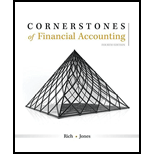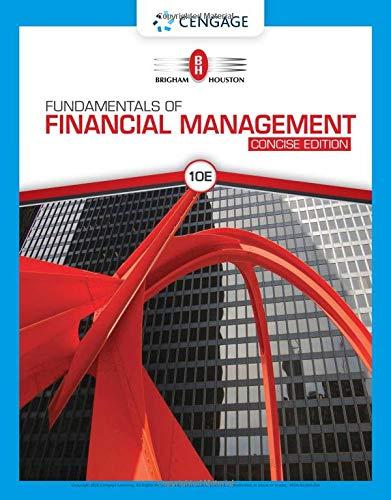
(a)
Introduction:
Dividend is the amount that is paid to the stockholders’ periodically as a
To prepare:
Journal Entries for cash dividend and calculate value of
Answer to Problem 86PSB
After paying Cash dividend,
Retained Earnings = $389,000
Total Assets = $3,850,000
Journal Entries
| Date | Particulars | Debit ($) | Credit ($) |
| December 31 | Retained Earnings Dr. Dividends Payable (Declaration of cash dividend.) |
22,000 | 22,000 |
| December 31 | Dividends Payable Dr. Cash (Payment of declared dividend.) |
22,000 | 22,000 |
Explanation of Solution
Given:
Total Assets is equal to $3,872,000, common stock selling at $23 as on 31st December 2019 and following equity statement:
| Particulars | $ |
| Common stock, $5 par, 10,000 shares issued and outstanding | 95,000 |
| (+) Additional Paid-in capital − common stock | 162,000 |
| Total Capital Stock | 257,000 |
| Retained Earnings | 411,000 |
| Total |
668,000 |
There are two types of dividend i.e. Stock and Cash Dividend.
- The first effect of both the dividends (cash or stock) is on Retained Earnings of the company. The dividend payable amount reduces the balance in retained earnings.
- The second effect of the dividend (cash or stock) is on the account through which they are paid.
- If cash dividend is paid then the second effect is on cash account as cash in the company decreases.
- If stock dividend is paid then the second effect is on common stock and additional paid in capital account as new shares are issued as dividends which further increase the balance of these accounts.
Before Cash Dividend was paid,
Retained Earnings = $411,000
Total Assets = $3,872,000
After payment of Cash Dividend of $22,000,
Retained Earnings = $411,000 - $22,000
Retained Earnings = $389,000
Total Assets = $3,872,000 - $22,000
Total Assets = $3,850,000.
(b)
Introduction:
Dividend is the amount that is paid to the stockholders’ periodically as a return on their investment in the company. Dividend can be made in two forms i.e. Cash Dividend and Stock Dividend.
To prepare:
Answer to Problem 86PSB
After paying Stock dividend,
Retained Earnings = $383,400
Total Assets (will remain same) = $3,872,000
Journal Entries
| Date | Particulars | Debit ($) | Credit ($) |
| December 31 | Retained Earnings Dr. Common Stock Additional Paid-in Capital (Declaration of cash dividend.) |
27,600 | 6,000 21,600 |
Explanation of Solution
Given:
Total Assets is equal to $3,872,000, common stock selling at $23 as on 31st December 2019 and following equity statement:
| Particulars | $ |
| Common stock, $5 par, 10,000 shares issued and outstanding | 95,000 |
| (+) Additional Paid-in capital − common stock | 162,000 |
| Total Capital Stock | 257,000 |
| Retained Earnings | 411,000 |
| Total Stockholders’ equity | 668,000 |
There are two types of dividend i.e. Stock and Cash Dividend.
- The first effect of both the dividends (cash or stock) is on Retained Earnings of the company. The dividend payable amount reduces the balance in retained earnings.
- The second effect of the dividend (cash or stock) is on the account through which they are paid.
- If cash dividend is paid then the second effect is on cash account as cash in the company decreases.
- If stock dividend is paid then the second effect is on common stock and additional paid in capital account as new shares are issued as dividends which further increase the balance of these accounts.
No. of shares outstanding = 10,000
Stock Dividend = 12%
Stock Dividend = 1,200 shares
Total Par value of stock dividend =
Total Par value of stock dividend =
Total Par value of stock dividend = $6,000
Total Market value of stock dividend =
Total Market value of stock dividend =
Total Market value of stock dividend = $27,600
Additional Paid in capital = $27,600 - $6,000
Additional Paid in capital = $21,600
Before Stock Dividend was paid,
Retained Earnings = $411,000
Total Assets = $3,872,000
After payment of Stock Dividend,
Retained Earnings = $411,000 - $$27,600
Retained Earnings = $383,400
Total Assets (will remain same) = $3,872,000.
(c)
Introduction:
In stock split, shares outstanding increases by given ratio and the price of stock decreases by the same ratio wherein the total stockholders’ equity remains unchanged.
To state:
Whether journal entry will be recorded for stock split and the value of retained earnings as well total assets.
Answer to Problem 86PSB
After Stock-split,
Retained Earnings = $411,000
Total Assets = $3,872,000
Stock split doesn’t affect the Total assets as well retained earnings. Thus, they remain same. It only affects no. of shares outstanding and price per share (still stockholders’ equity remains unchanged).
Since there is no actual change in stockholders’ equity or
Explanation of Solution
Given:
Total Assets is equal to $3,872,000, common stock selling at $23 as on 31st December 2019 and following equity statement:
| Particulars | $ |
| Common stock, $5 par, 10,000 shares issued and outstanding | 95,000 |
| (+) Additional Paid-in capital − common stock | 162,000 |
| Total Capital Stock | 257,000 |
| Retained Earnings | 411,000 |
| Total Stockholders’ equity | 668,000 |
Before stock split,
No. of shares outstanding = 10,000
Par Value = $5
After stock split,
Stock Split ratio = 2-for-1
No. of shares outstanding =
No. of shares outstanding = 20,000
Par Value =
Par Value = $2.5
Before Stock-split,
Retained Earnings = $411,000
Total Assets = $3,872,000
Shareholders’ equity =
Shareholders’ equity =
Shareholders’ equity = $50,000
After Stock-split,
Retained Earnings = $411,000
Total Assets = $3,872,000
Shareholders’ equity =
Shareholders’ equity =
Shareholders’ equity = $50,000.
Want to see more full solutions like this?
Chapter 10 Solutions
Cornerstones of Financial Accounting
- Please provide the solution to this financial accounting question using proper accounting principles.arrow_forwardBelow is information for Blue Company. Using this information, answer the following questions on the "Calculation" tab in the file. Show your work (how you got your answer) and format appropriately. Blue company has prepared the following contribution format income statement based on a sales volume of 1,000 units (the relevant range of production is 500 to 1,500 units): Sales $ 40,000 Variable expenses 24,000 Contribution margin 16,000 NOTE: Use the amounts in the original fact pattern to the left as your basis for the questions below. Fixed expenses 12,000 Net operating income $ 4,000 Questions: 1. What is the contribution margin per unit? 2. What is the contribution margin ratio? 3. What is…arrow_forwardI am looking for help with this financial accounting question using proper accounting standards.arrow_forward
- General accountingarrow_forwardPlease explain the correct approach for solving this general accounting question.arrow_forwardRobin Corporation has ordinary income from operations of $30,000, net long-term capital gain of $10,000, and net short-term capital loss of $15,000. What is the taxable income for 2010? a) $25,000. b) $27,000. c) $28,500. d) $30,000. e) None of the above.arrow_forward
- Please explain the solution to this financial accounting problem using the correct financial principles.arrow_forwardI need the correct answer to this financial accounting problem using the standard accounting approach.arrow_forwardI am trying to find the accurate solution to this general accounting problem with the correct explanation.arrow_forward
 Cornerstones of Financial AccountingAccountingISBN:9781337690881Author:Jay Rich, Jeff JonesPublisher:Cengage Learning
Cornerstones of Financial AccountingAccountingISBN:9781337690881Author:Jay Rich, Jeff JonesPublisher:Cengage Learning Intermediate Accounting: Reporting And AnalysisAccountingISBN:9781337788281Author:James M. Wahlen, Jefferson P. Jones, Donald PagachPublisher:Cengage Learning
Intermediate Accounting: Reporting And AnalysisAccountingISBN:9781337788281Author:James M. Wahlen, Jefferson P. Jones, Donald PagachPublisher:Cengage Learning Fundamentals Of Financial Management, Concise Edi...FinanceISBN:9781337902571Author:Eugene F. Brigham, Joel F. HoustonPublisher:Cengage Learning
Fundamentals Of Financial Management, Concise Edi...FinanceISBN:9781337902571Author:Eugene F. Brigham, Joel F. HoustonPublisher:Cengage Learning Financial Accounting: The Impact on Decision Make...AccountingISBN:9781305654174Author:Gary A. Porter, Curtis L. NortonPublisher:Cengage Learning
Financial Accounting: The Impact on Decision Make...AccountingISBN:9781305654174Author:Gary A. Porter, Curtis L. NortonPublisher:Cengage Learning College Accounting, Chapters 1-27AccountingISBN:9781337794756Author:HEINTZ, James A.Publisher:Cengage Learning,
College Accounting, Chapters 1-27AccountingISBN:9781337794756Author:HEINTZ, James A.Publisher:Cengage Learning, Managerial AccountingAccountingISBN:9781337912020Author:Carl Warren, Ph.d. Cma William B. TaylerPublisher:South-Western College Pub
Managerial AccountingAccountingISBN:9781337912020Author:Carl Warren, Ph.d. Cma William B. TaylerPublisher:South-Western College Pub





